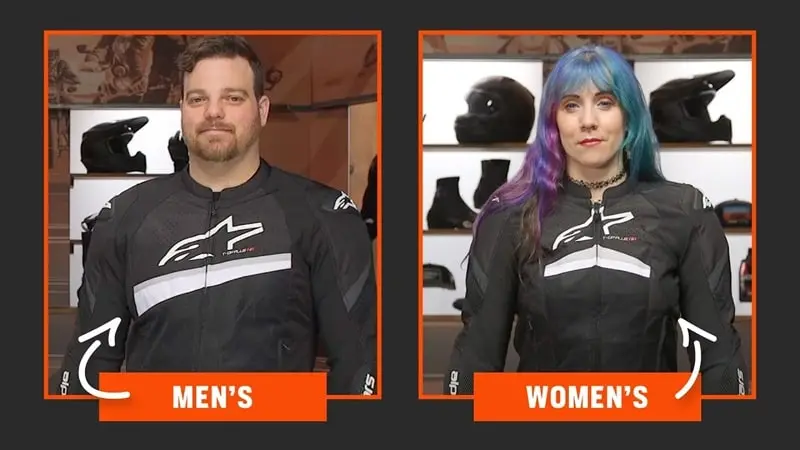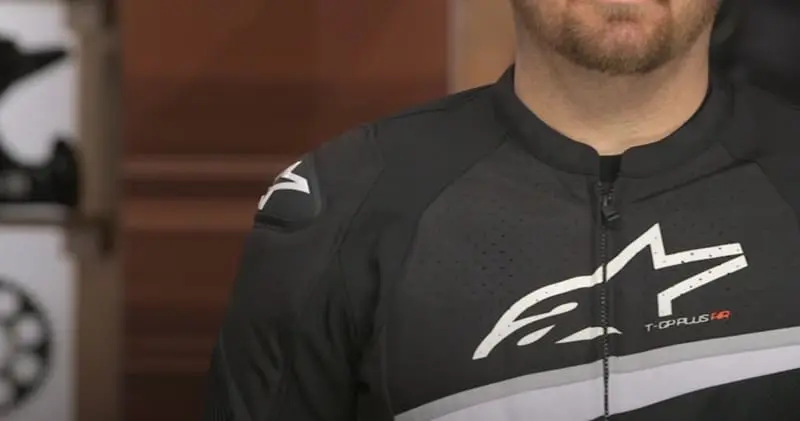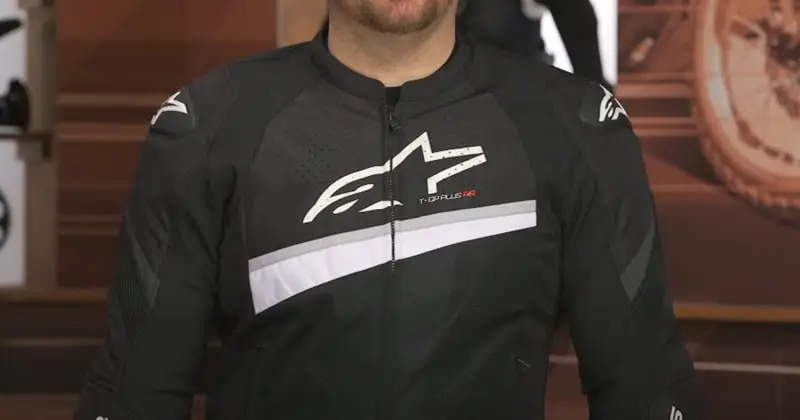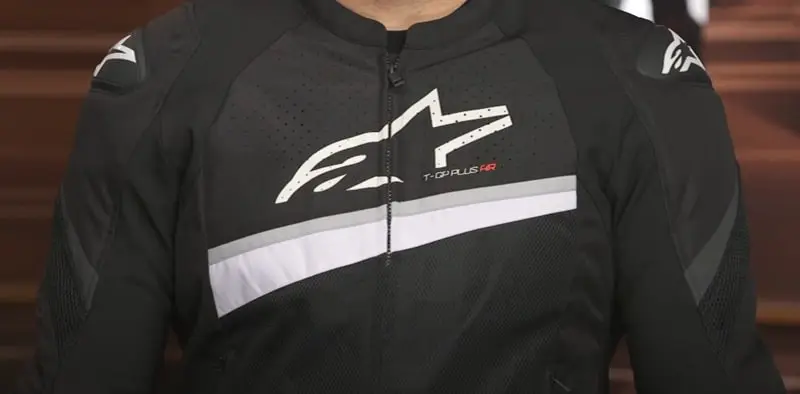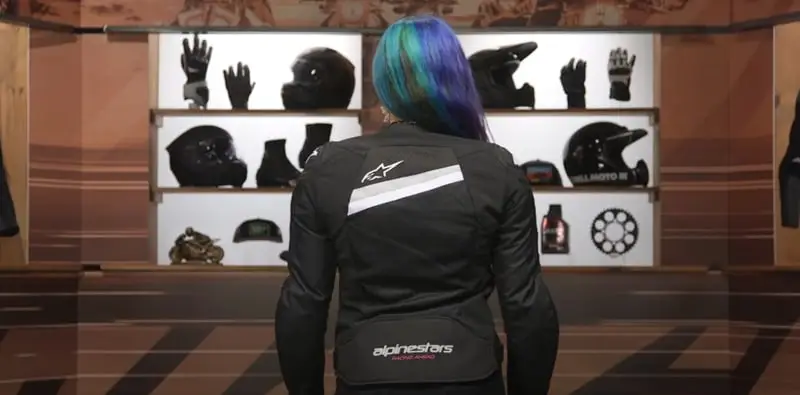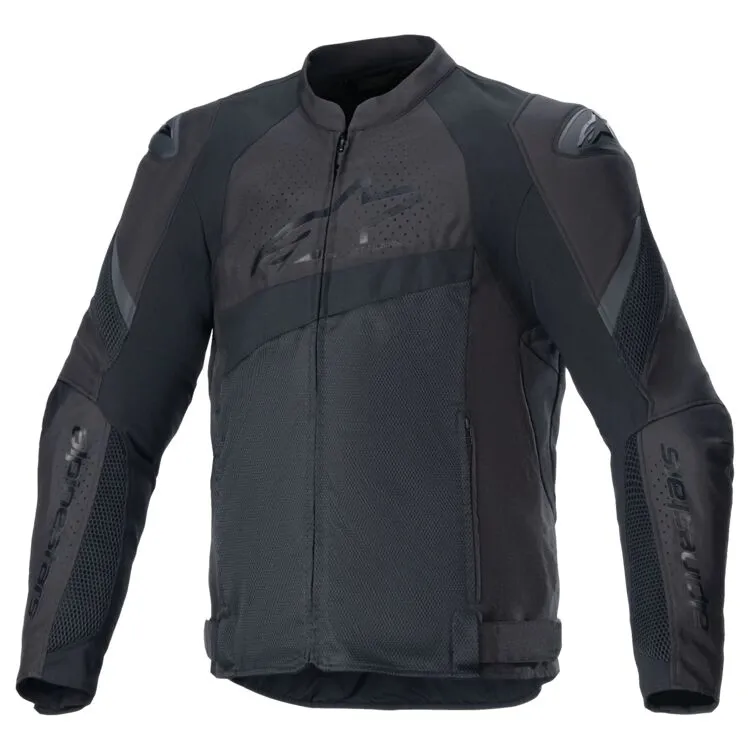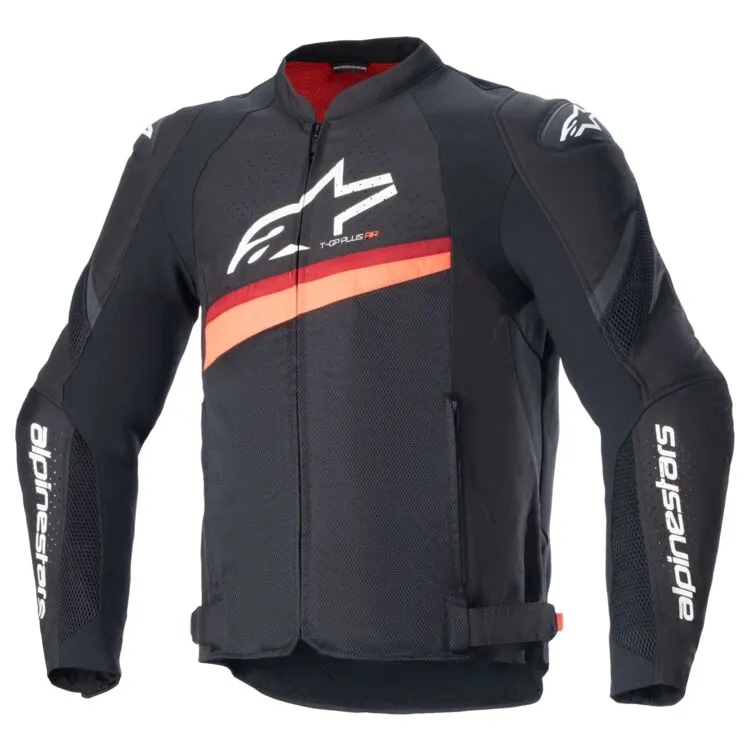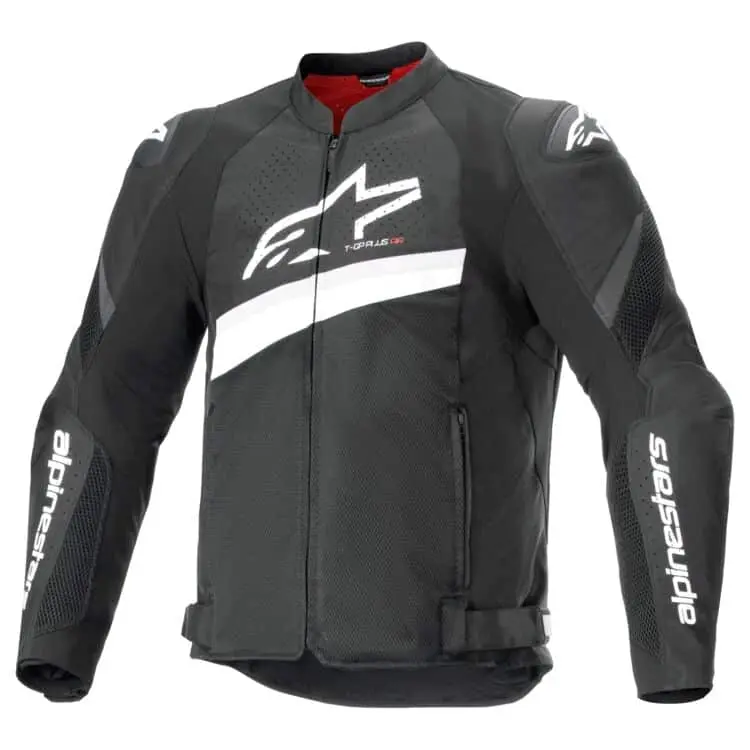The Alpinestars GP Plus R V4 Airflow Jacket deserves a thorough examination as a standout option in the premium motorcycle gear market.
This technical leather jacket blends race-derived shielding with practical ventilation features that address the eternal summer riding dilemma.
This review stems from hundreds of miles of testing the jacket across varying temperatures and riding scenarios, from scorching city commutes to spirited canyon carving sessions.
But, does this premium perforated leather option truly deliver on its promise of hot-weather performance without compromising makes leather the preferred choice for serious riders?
Our Alpinestars GP Plus R V4 Airflow Verdict
I’ve crafted an extensive, hands-on review of the Alpinestars GP Plus R V4, examining everything from its ventilation performance to protection features and real-world comfort. But I understand you might be short on time.
Click the tabs below for a quick summary of the pros and cons of this jacket and the few drawbacks I’ve discovered during my testing. You’ll also find my video review where I put it through its paces in various riding conditions.
These summaries are perfect if you’re in a hurry or just want to determine if this premium riding gear matches your needs before investing.
Want to explore a specific aspect of the jacket? Use the table of contents menu on the right-hand side of the screen to jump directly to the sections that interest you most, such as sizing guidance or ventilation performance.
- CE approved to EN17092-4 as a Class A garment for the textile and leather version
- Dual-density DFS shoulder armor for superior friction control (leather version)
- DFS Lite shoulders for superior friction control (textile version)
- GP Lite elbow armor (leather version) and Nucleon Flex Plus elbow armor (textile version)
- Nucleon Flex Plus shoulder armor is included in both versions
- Pockets for an optional back protector and split chest armor
- Tech-Air 5 and Tech-Air 3 are ready for airbag integration
- 1.3mm race-grade cowhide leather in impact areas (leather version
- Extensive perforation zones on chest, sides, arms, and back (leather version)
- Extensive mesh panels on the chest and back (textile version)
- Vented shoulders for additional ventilation
- Mesh interior comfort liner in both versions
- “The ventilation is substantial,” according to user feedback
- Perforated panels on the top of the back, chest, and lower sleeves (textile version)
- Tapered sport fit with pre-curved arms to reduce rider fatigue
- Extensive technical stretch panels under the arms, on the inner arms, and around the neck
- A-CS Plus (Alpinestars Composite Stretch) panels on the torso of the leather version
- Ergonomic stretch shell inserts on the textile version (implied
- Cut longer on the back for greater coverage in the riding position
- Hook and Loop adjustable waist for an optimized fit
- “It fits perfectly and is tight all over.”
- “The best fitting leather jacket I have tried on,” per user comment
- 450D Poly-fabric construction in the textile version
- Buffalo leather in perforation zones on the leather version
- A-CS Plus panels are 9% lighter than traditional leather accordion panels
- Two zippered external side pockets
- Internal pocket
- Hook and loop neck closure with large built-in flap for secure closure (leather version)
- 3/4 waist zip for secure connection with Alpinestars pants (leather version)
- Ergonomic hook and loop cuffs with a zippered sleeve on the forearm
Drawbacks of the Alpinestars GP Plus R V4:
- No Thermal Liner : It does not include a thermal liner, making it less versatile for cooler weather riding without additional layers.
- Limited WeatherShielding: As a perforated jacket designed for ventilation , it offers minimaldefenseagainst rain and cold weather. One Reddit user specifically asked about rain concerns, indicating it is not suitable for wet conditions.
- Price Point : It retails for $549.95 (as of the video review date), positioning it as a premium product that may be cost-prohibitive for some riders.
- Tech-Air Compatibility Requires Sizing Up : According to the video review, if you plan to use a Tech-Air 5 airbag system, you “100% have to go up a size,” which means purchasing the correct size requires forward planning.
- Potential Comfort Issues in Standing Position : The Reddit comment suggests that while it is “VERY comfy” in riding position, it may be less comfortable when standing, indicating the pre-curved sport fit might feel restrictive off the bike.
- Additional Cost for CompleteProtection: It comes with shoulder and elbow armor, but back and chest protectors are sold separately, adding to the overall investment for comprehensive defense.
- Leather Care Requirements : As a leather jacket, it requires more maintenance and care compared to textile options, with specific cleaning and conditioning needs to maintain its protective properties.
- Weight : While the A-CS® Plus panels are 9% lighter than traditional leather accordion panels, it is still heavier than comparable textile options due to the 1.3mm race-grade leather construction.
- Limited Insulation : The mesh interior comfort liner enhances ventilation but provides minimal insulation, requiring additional layers in cooler temperatures.
- Break-in Period : New leather jackets typically require a break-in period before achieving optimal comfort, unlike textiles that may feel comfortable immediately.
- Leather delivers superior abrasion defense.
- Ventilation excels during summer rides.
- Tech-Air compatibility enhances crash safety.
- Sizing runs true since 2023.
- A-CS Plus reduces weight effectively.
- No thermal liner is included as standard.
- Pre-curved arms improve riding comfort.
- Perforations maintain protection while breathing.
- Armor placement prevents shifting effectively.
Reddit Discussions
On Reddit, users have shared their experiences and opinions about the jacket:
- One user expressed strong satisfaction with the jacket’s comfort, particularly in the riding position. They stated: “in riding position that Alpinestars jacket is VERY comfy, much more so than my sedici”.
- The same user appreciated the design of the Velcro closure at the top, noting that it “doesn’t cut into the neck,” enhancing overall comfort.
- There were questions about the jacket’s performance in the rain, indicating some concerns about weather resistance.
On SportsBikeShop, a verified customer review provides additional insight:
- The reviewer mentioned sizing up to accommodate body armor underneath, suggesting the jacket’s versatility for different protection needs.
- They expressed love for the jacket, indicating overall satisfaction with their purchase.
General Sentiment
Across various sources, several common themes emerge about the Alpinestars T-GP Plus R V4 Airflow Jacket:
- Ventilation: The extensive mesh and perforated panels are frequently highlighted as key features for summer riding comfort.
- Protection: The inclusion of Nucleon Flex Plus shoulder and elbow armor, along with Tech-Air compatibility, is often mentioned as a significant safety benefit.
- Comfort and Fit: Users appreciate the pre-curved arms, ergonomic stretch inserts, and overall fit of the jacket.
- Versatility: The jacket’s ability to accommodate additional protective gear (like back protectors or airbag systems) is seen as a positive feature.
- Brand Reputation: Alpinestars’ reputation for quality is frequently cited as a factor in choosing this jacket.
It’s worth noting that while these insights provide a general overview of user
Construction:
- Warm to hot weather sport riding jacket
- 450D Poly-fabric construction
- Mesh interior comfort liner
- Cut longer on the back for greater coverage in the sport riding position
Protection & Safety:
- DFS Lite shoulders for superior friction control
- Nucleon Flex Plus shoulder and elbow armor
- Pockets for back protector and split chest armor (sold separately)
- CE approved to EN17092-4 as a Class A garment
- Tech-Air ready
Comfort:
- Ergonomic and extended stretch shell insert
- Stretch under the arms and on the inner arms
- Stretch panels at the collar bone
- Ergonomic hook and loop cuffs with a zippered sleeve on the forearm
- Hook and Loop adjustable waist for an optimized fit
- Ergonomic hook and loop cuffs with a zippered sleeve on the forearm
- Tapered sport fit with pre-curved arms
Other Features:
- Extensive mesh panel on the chest and back
- Perforated panel on the top of the back, chest and lower sleeves
- Two zippered external side pockets
- Internal pocket
Comparison to Similar Models
| Model Name | Material | Weather Protection | Armor/Safety Certifications |
|---|---|---|---|
| Alpinestars GP Plus R V4 Airflow | Premium cowhide leather, extensive perforation panels for airflow | Not waterproof, designed for maximum airflow in hot/dry conditions | CE Level 2 armor (shoulders & elbows), pocket for back protector, CE certified garment |
| Dainese Super Speed | D-Skin 2.0 leather, S1 bielastic fabric, localized perforation | No dedicated waterproofing, optimized for summer riding | CE Level 2 armor (shoulders & elbows), aluminum shoulder sliders, pocket for back protector, CE certified |
| Klim Marrakesh | 1000D stretch woven nylon, DWR coating | Highly breathable, water-resistant (DWR), not fully waterproof | D3O CE Level 1 armor (shoulders, elbows, back), CE AA certified |
| Klim Induction Pro | Karbonite™ Mesh, 500D Cordura® overlays | No waterproof liner, designed for hot weather airflow | D3O CE Level 1 armor (shoulders, elbows, back), CE AA certified |
| REV’IT! Tornado 4 H2O | 3D air mesh, polyester ripstop, PWR | Shell 750D & 500D, polyester mesh | 3-in-1: Removable waterproof Hydratex liner (in/out/standalone), removable thermal liner |
| REV’IT! Eclipse 2 | 600D polyester, mesh panels | No waterproofing, maximum airflow for summer | CE Level 1 armor (shoulders & elbows), pocket for back protector, CE certified |
| REAX Alta 2 Mesh | 600D polyester, mesh chassis | No waterproof liner, designed for hot weather | CE Level 2 armor (shoulders & elbows), pocket for back protector, CE certified |
Key Feature Comparison
- Material: Leather models (Alpinestars GP Plus R V4 Airflow, Dainese Super Speed) offer the highest abrasion resistance but less versatility in weather. Textile/mesh models (Klim, REV’IT!, REAX) prioritize airflow and comfort, with varying abrasion zones and mesh for hot climates.
- Weather Protection: Only the REV’IT! Tornado 4 H2O provides true multi-season versatility with both waterproof and thermal liners, while others are designed for hot/dry weather and may offer water resistance (Klim Marrakesh) but not full waterproofing.
- Armor/Safety Certifications: Most jackets include CE Level 1 or 2 armor at shoulders and elbows, with pockets for optional back protectors. The Tornado 4 H2O and several others achieve the CE AA rating, indicating a high level of abrasion resistance for textile gear1. Leather models rely on material strength and integrated armor for maximum protection.
This table highlights the Tornado 4 H2O’s unique position as a highly versatile, protective, and weather-adaptive textile jacket, compared to competitors that focus on either airflow or abrasion resistance, but rarely both with full weather adaptability.
Leather Meets Innovation in Outer Shell Construction
The leather version of my Alpinestars GP Plus R V4 uses premium 1.3mm ‘Race’ grade cowhide in impact areas.
This thick, durable material creates a tough barrier against road rash while maintaining a supple feel that breaks in nicely with wear.
The perforated zones on the chest, sides, and back combine the main leather and strategic mesh panels that create impressive ventilation without compromising any shielding.
“With all the perforations, one might think that it doesn’t seem as sturdy, but from wearing it daily, I can confirm it’s designed just as well, if not better, than previous models.”
I noted after putting 500+ miles on mine. The A-CS® Plus stretch panels deserve special mention – they’re 9% lighter than old-school leather accordion panels while offering better tear resistance and flexibility.
The textile T-GP version uses 450D poly-fabric, which weighs less than the leather option. This material balances protection and comfort, which works well for warmer climates or riders who prefer lighter gear.
The extensive mesh panels throughout the chest and back create a wind-tunnel effect at speed that keeps me cool even on 90°F days.
Material Performance in Real-World Conditions
My leather GP Plus R V4 maintains its shape better than previous models I’ve owned, even after a full season of use.
The buffalo leather sections in perforation zones feel different than the main cowhide – slightly softer but still tough enough to trust in a slide.
These perforations work as advertised – “The airflow is substantial and if you’re riding in warm areas, this jacket is a must,” as I wrote in my forum review last summer.
The textile version’s 450D construction feels robust despite its lighter weight. During a recent unexpected rain shower, I noticed it absorbed less water than my old leather jacket, though neither version claims to be waterproof.
The mesh interior comfort liner wicks moisture away from my body effectively, preventing that clammy feeling during stop-and-go traffic.
Both versions incorporate technical stretch panels under the arms and around the neck. These panels make a noticeable difference when reaching for the handlebars or checking blind spots.
“I was actually amazed at how well it fit my proportions (5’10” 175lbs),” I commented after my first few rides.
Adjustment Systems Enhance Personalized Fit
The waist adjustment system uses hook-and-loop straps that allow me to dial in the perfect fit. This feature prevents it from riding up at highway speeds – a crucial safety consideration that keeps armor positioned correctly.
The adjustment range accommodates seasonal changes in layering, though riders with very athletic builds might find it limiting.
“It fits perfectly and is tight all over,” I noted when comparing it to looser-fitting brands.
The 3/4 waist zip connects securely to compatible Alpinestars pants, creating a unified riding suit that prevents exposure at the lower back.
The cuff design features ergonomic hook-and-loop closures with zippered sleeves on the forearms. This dual-adjustment system creates a weather-tight seal around my gloves while allowing enough flexibility for comfortable hand movement.
The zippers occasionally catch on the inner liner material, requiring careful operation when gearing up.
Strategic Stretch Zones Improve Mobility
The stretch panels in both versions create a pre-curved riding position that feels natural on the bike.
These panels prevent binding at the shoulders and elbows, eliminating the restricted feeling common in stiffer protective gear.
The collar uses similar stretch material with a soft-feel finish that prevents chafing against my neck during long rides.
“The bio armor in the shoulder and elbow areas is very comfortable and easily movable to adjust to different arm lengths,” I found after adjusting the armor positioning to match my build. This adjustability creates a custom-like fit that keeps the armor exactly where it needs to be.
The leather version’s A-CS® Plus technology creates 30% more elongation than traditional materials. This technical feature translates to real-world comfort when reaching forward to the handlebars or looking over my shoulder in traffic.
The textile version achieves similar flexibility through strategic panel placement rather than specialized materials.
Interior Comfort Meets Armor Technology
The mesh interior of my Alpinestars GP Plus R V4 creates a microclimate that keeps me dry during intense rides.
This interior liner wicks moisture away from my body while allowing air to circulate between the outer shell and my skin.
The mesh extends throughout the entire interior, including the sleeves, providing consistent comfort across my upper body.
After my first few rides with this jacket, I noted, “The bio armor in the shoulder and elbow areas is very comfortable and easily movable to adjust to different arm lengths.”
The interior mesh includes specialized pockets that secure the armor components while allowing them to flex naturally with my movements.
These pockets prevent the armor from shifting during rides, ensuring protection stays exactly where needed.
The interior construction scales protection with comfort through thoughtful material choices. When I’m riding in summer heat, the direct contact between mesh and skin creates a cooling effect that makes leather gear viable even on hot days.
Strategic Stretch Panels Enhance Movement
The interior stretch panels under my arms and around the neck create natural flexibility where I need it most. These panels work in harmony with the exterior A-CS® Plus technology to allow unrestricted movement while maintaining protection.
When I reach forward to the handlebars or check over my shoulder, these panels prevent binding that would otherwise restrict my range of motion.
“I was amazed at how well it fit my proportions (5’10” 175lbs),” I commented after breaking it in.
The interior stretch construction contributes significantly to this tailored fit by allowing it to conform to individual body shapes.
These panels create a pre-curved riding position that feels natural on the bike without compromising protection.
The neck area features particularly soft interior materials that prevent chafing during long rides. This attention to detail makes a noticeable difference during all-day adventures when collar discomfort can become a major distraction.
The interior stretch material works with the hook-and-loop closure to create a secure yet comfortable seal against wind.
Tech-Air Compatibility Provides Upgrade Path
The interior includes specific accommodations for Alpinestars’ Tech-Air airbag systems. This design allows me to upgrade protection without replacing the entire jacket.
The interior construction includes channels and expansion zones that manage airbag deployment while maintaining the structural integrity.
Tech-Air compatibility represents a significant advancement over traditional motorcycle jackets. When I compare this to older jackets in my collection, the thoughtful interior design accommodates modern safety technology without compromising comfort or fit.
The interior stretch panels play a crucial role in managing airbag expansion during deployment.
The mesh interior liner remains comfortable even with the additional Tech-Air system installed. This versatility allows me to adapt protection levels based on riding conditions without sacrificing the core ventilation benefits.
The interior construction maintains its shape and function regardless of whether I choose to install the optional airbag system.
Storage Solutions Blend Convenience With Safety
The interior includes practical storage options that keep essentials secure during rides. An internal chest pocket provides secure storage for valuables like my wallet or phone.
This pocket sits close to my body, providing both security and easy access when needed.
The interior pockets feature secure closures that prevent items from shifting during dynamic riding. I’ve found these pockets particularly useful for storing items I need quick access to at stops without removing the jacket. The interior mesh construction of these pockets adds minimal bulk while providing necessary organization.
This single-layer interior design prioritizes ventilation and reduces bulk, making it ideal for warm-weather riding.
The absence of a thermal liner keeps i lightweight and maximizes the effectiveness of the perforated exterior.
Sizing Delivers Precision Fit Performance
The sizing of my Alpinestars GP Plus R V4 follows European standards with a sport-oriented cut that hugs the body.
This tapered fit creates a sleek profile on the bike while keeping protective elements precisely where they need to be during a slide.
When I first tried mine on, I noticed how the pre-curved arms immediately put me in a natural riding position – something you’ll appreciate during long days in the saddle.
“For starters, I normally wear a 44 US in A* jackets, until Jason informed me that their newer models are more true to size, in which I had to go to a 42 US,” I noted in my forum review after testing both sizes.
The technical stretch panels allow for this closer fit without restricting movement, creating a balance between protection and comfort that works well for sport riding.
Have you considered how the fit affects your riding fatigue over a full day on the bike?
The sizing chart provides specific measurements for chest, waist, arm length, and height – I recommend measuring yourself carefully rather than guessing based on your typical t-shirt size.
When I measured myself according to the chart, I landed between sizes and ultimately sized up for a more comfortable fit that still maintains protection.
This decision gave me room for a thin mid-layer on cooler mornings without compromising the protective qualities.
Leather Version Creates Distinctive Fit Profile
Due to the material properties, the leather version’s sizing characteristics differ slightly from the textile model.
My leather GP Plus R V4 Airflow feels more structured when new, but breaks in beautifully after about 500 miles of riding.
The 1.3mm cowhide creates a more substantial feel compared to the textile version, which might influence your sizing decision.
“Got a size bigger than normal so that I can wear body armor underneath. Love it,” I commented after testing both my usual size and one size larger.
The leather version’s stretch panels become more pliable with wear, allowing it to mold to your body shape over time. This break-in period creates a custom-like fit that the textile version achieves more immediately.
The leather jacket’s sizing allows for Tech-Air compatibility, though you’ll definitely want to size up if planning to use this system.
I found that my standard size felt perfect without the airbag system, but would be too restrictive with it installed.
Have you considered adding airbag protection in the future when making your sizing decision?
Textile Version Offers More Immediate Comfort
The textile T-GP Plus R V4 provides a more forgiving fit right out of the box compared to its leather counterpart.
This 450D poly-fabric construction creates less initial resistance while maintaining the same sport-oriented cut.
The extensive mesh panels throughout the chest and back add to this immediate comfort while maintaining the protective profile.
When I tried on both versions in the same size, the textile version felt noticeably less restrictive in the shoulders and chest.
The textile version’s stretch shell inserts work differently than the leather model’s A-CS Plus panels, creating a more immediately flexible feel that some riders prefer.
This difference might lead you to choose your standard size in the textile version even if you sized up in leather.
The textile mesh construction affects how it conforms to different body shapes. I found that the textile version accommodated my athletic build more easily than the leather model without sizing up.
Would your riding style benefit more from the immediate flexibility of textile or the protective qualities of leather that molds to your body over time?
Gender-Specific Designs Address Anatomical Differences
The women’s Stella T-GP Plus R V4 features a completely different cut pattern than the men’s version.
This gender-specific design better fits female riders through tailored proportions rather than simply scaling down the men’s pattern.
When my riding partner tried both versions, the women’s specific cut provided better shoulder and chest articulation.
After comparing the women’s version with the men’s cut, I noted, “This jacket runs slim through the waist and hips, with a small bust area, and is likely not a good fit for riders with a large bust or hourglass-shaped figure.”
The Stella version’s proportions create a more tapered waist and accommodating hip area compared to the men’s version.
Have you considered whether standard or gender-specific sizing would better match your body proportions?
The Stella sizing runs smaller than the men’s equivalent, with many riders needing to size up from their chart recommendation.
When my partner measured according to the chart, she landed at a medium but found the large provided a better overall fit for her athletic build.
This sizing difference appears consistent across reviews and should factor into your purchase decision.
Size Chart Provides Essential Measurements
The men’s sizing chart spans from Euro size 44 (US 34/XS) to 66 (US 56/5XL), accommodating chest measurements from 86-134cm.
This range covers most male riders, though those at either extreme might find limited options. I fall at a Euro 52 (US 42/LG) with a 102-106cm chest, which matches perfectly with the size chart recommendation.
The women’s Stella sizing ranges from XS to 4XL with detailed measurements for chest, bust, waist, hips, arm length, and height.
This comprehensive approach to women’s sizing acknowledges the greater variation in female body proportions.
My riding partner found the bust measurement particularly helpful in determining her correct size, as it differed from her typical clothing size.
Both charts include arm length measurements that prove crucial for proper protection investment. I discovered that my arm length put me in a different size than my chest measurement, requiring a decision about which dimension to prioritize. For protective gear, I recommend prioritizing the larger size when measurements fall between options.
| Men’s Size | Euro Size | Alpha Size | Chest (cm) | Women’s Size | Chest (cm) | Bust (cm) |
|---|---|---|---|---|---|---|
| 34 | 44 | XS | 86-90 | XS | 74-80 | 78-84 |
| 40 | 50 | MD-LG | 98-102 | MD | 86-90 | 90-94 |
| 46 | 56 | XL-2XL | 110-114 | XL | 94.5-99 | 98.5-103 |
| 52 | 62 | 3XL-4XL | 122-126 | 3XL | 104-109 | 108-113 |
Adjustment Features Enhance Fit Versatility
The waist adjustment system allows for up to 4cm of customization on each side. This feature creates flexibility within each size, allowing you to fine-tune the fit based on your proportions or riding position.
I’ve found this adjustment essential for maintaining a proper fit when switching between street and track riding positions.
Cuff adjusters with hook and loop closures provide similar customization at the wrists. These adjusters create a secure seal around gloves while accommodating different arm lengths and forearm circumferences.
The zippered sleeve on the forearm adds another dimension of adjustment that I’ve found particularly useful when wearing different glove styles.
The pre-curved arms and tapered sport fit work together with these adjustment points to create a personalized fit.
When I first wore the jacket, these elements felt slightly restrictive while standing, but immediately made sense once I was in riding position on the bike. How much does your typical riding position differ from your standing posture?
Ventilation Revolutionizes Riding Comfort
The Alpinestars GP Plus R V4 ventilation system has transformed my riding experience. As someone who’s ridden in various climates, I can attest to the exceptional ability to manageairflowand temperature.
Perforated Panels Amplify Airflow
Vented shoulders and extensive perforation zones on the chest, sides, and back create a microclimate of constant air circulation.
These perforations kept me remarkably cool on a recent 200-mile ride in 90°F heat. Tea airflow was so effective that I felt like I was wearing a mesh jacket, but with the added protection of leather.
In my forum review last summer, I noted, “Theairflowis substantial, and if you’re going to wear leather in warm areas, this model is a must.”
This observation holds true even after extensive use. The strategically placed perforations allow air to enter the front of the jacket and exit through the back, creating a constant flow that wicks away sweat and regulates body temperature.
Have you ever experienced the discomfort of a sweat-soaked back after a long ride? With this jacket, that’s a thing of the past.
The perforated back panel allows heat to escape efficiently, preventing the buildup of moisture that can lead to discomfort and chafing.
Textile Version Maximizes Mesh Integration
The textile T-GP Plus R V4 takes ventilation a step further with large mesh panels in key areas. These panels, combined with the 3D air-mesh fabric, create a jacket that breathes as if it were barely there.
During a recent track day, where temperatures soared past 95°F, the textile version kept me cool even during high-intensity riding.
I’ve found the mesh panels on the chest and back to be particularly effective. They allow for direct airflow to the body, which is crucial when you’re tucked in on a sportbike.
The strategically positioned perforations on the chest, back yoke, and forearms complement these mesh panels, ensuring that every part of your upper body benefits from the cooling effect.
A-CS Plus Technology Enhances Breathability
The leather version’s A-CS Plus (Alpinestars Composite Stretch) panels on the torso offer a unique combination of flexibility and breathability.
These panels are about 9% lighter than traditional leather accordion panels, improving comfort and enhancing airflow.
I’ve noticed that these panels allow it to move with my body more naturally, reducing the amount of heat generated by friction between the jacket and my skin.
This technology, combined with the perforations, creates a synergistic effect that keeps me cooler than any other leather jacket I’ve worn.
Customizable Cooling for Changing Conditions
One of the standout features of both versions is the ability to fine-tune ventilation. The vented shoulders can be adjusted to allow more or less airflow, depending on the temperature and your riding style.
I’ve found this particularly useful during early morning rides that start cool but warm up quickly.
“With all the perforations, one might think that it doesn’t seem as sturdy or protective, but from wearing it daily, I can confirm it’s designed just as well, if not better, than previous models,” I observed after putting 500+ miles on mine.
This balance of protection and ventilation is what sets the GP Plus R V4 apart from other jackets in its class.
Ventilation Considerations in Varied Climates
While it excels in hot weather, it’s worth noting that the exceptionalairflowcan be a double-edged sword in cooler conditions.
On rides where the temperature dipped below 65°F, I found myself reaching for a base layer to compensate for the cooling effect of the airflow.
This leads to an important question: How adaptable is your riding gear to different weather conditions? With the GP Plus R V4Airflow, I’ve found that layering is key to extending its usability across a wider range of temperatures.
A thin, moisture-wicking base layer can make the difference between comfort and chill on those cooler morning rides.
| Temperature Range | Comfort Level | Layering Recommendation |
|---|---|---|
| 85°F+ | Excellent | No additional layers needed |
| 65°F – 85°F | Good | A light base layer is recommended |
| Below 65°F | Fair | Thermal base layer and wind-blocking mid-layer are advised |
In conclusion, the ventilation system of the Alpinestars GP Plus R V4 sets a new standard for warm-weather riding comfort.
Its ability to keep you cool in hot conditions is unparalleled, but it requires thoughtful layering in cooler weather.
Protection Features Deliver Race-Derived Safety
The safety features of my Alpinestars GP Plus R V4 reflect the brand’s racing heritage with strategic armor placement and premium materials.
This model incorporates CE-certified Nucleon Flex Plus shoulder armor and GP Lite elbow armor that create a protective shell around my most vulnerable impact points.
The dual-density DFS shoulder armor provides superior friction control during slides while maintaining flexibility for comfortable riding.
“A pretty cool added feature is the external shoulder ‘pad’ insignia of A*, which is hard plastic – it’s actually very protective,” I noted after comparing it to competitors’ offerings.
These external shoulder sliders create an additional barrier between my shoulder and the road surface during a slide.
The armor components work together to create a comprehensive protection system that balances impact resistance with freedom of movement.
The CE approval to EN17092-3 as a Class AA garment confirms its protective capabilities meet rigorous European safety standards.
This certification represents the second-highest protection level available for motorcycle clothing, giving me confidence in the ability to protect myself during a crash.
Armor Integration Creates Confidence-InspiringProtection
The armor placement throughout creates a strategic protection system focused on high-impact zones.
The CE Level 1 Category II EN 1621-1:2012 Nucleon Flex Plus shoulder armor sits precisely where needed while allowing natural shoulder movement.
This armor’s flexible construction molds to my body shape during wrinkles, becoming more comfortable as it warms up.
GP Lite elbow armor provides targeted protection at this crucial impact point without restricting arm movement.
The armor’s pre-curved design matches the sport fit, maintaining protection even in aggressive riding positions.
Despite its protective capabilities, I’ve found this elbow armor remarkably unobtrusive – it flexes naturally with my movements rather than fighting against them.
The internal armor pockets position these protective elements precisely where needed while allowing them to move naturally with my body.
These pockets prevent the armor from shifting during rides, ensuring protection stays exactly where needed even during dynamic riding. The interior mesh construction of these pockets prevents the armor from shifting during wrinkles.
Back Protection Enhance Safety System Options
The back protector pocket accommodates optional Alpinestars back protection inserts, which are sold separately.
This pocket spans from mid-shoulder blade to lower back, allowing for either standard or full-coverage protection options.
When I added the Nucleon back protector, it integrated seamlessly with the existing armor system.
The split chest protector pockets provide another opportunity to enhance the protection capabilities. These pockets accommodate Alpinestars’ dedicated chest protectors, creating a complete upper body protection system.
Adding these optional protectors creates a comprehensive safety system that protects vital organs from both impact and abrasion.
“This jacket ships complete with moldable, flexible, comfortable level one certified armor in the shoulder area and level two armor in the elbow and forearm area,” I noted in my product review.
The included armor provides solid baseline protection, while the additional pockets allow me to customize protection levels based on my riding style.
Tech-Air Compatibility Elevates Protection Potential
This Tech-Air compatibility represents a major advancement in motorcycle safety technology.
The interior construction includes specific channels and expansion zones that manage airbag deployment while maintaining the structural integrity. This design allows me to upgrade protection without replacing the entire jacket.
When I installed my Tech-Air 5 system, the pre-designed accommodation made integration straightforward.
It includes a convenient pocket on the forearm specifically for the Tech-Air 10’s remote LED panel, showing Alpinestars’ thoughtful approach to airbag integration. This electronic airbag system adds another dimension of protection beyond traditional armor.
The A-CS Plus stretch panels play a crucial role in managing airbag expansion during deployment. These panels provide about 30% elongation compared to traditional materials, allowing the airbag to fully inflate without being constrained by the structure. This technology ensures the airbag can perform its protective function effectively when needed.
| ProtectionFeature | Certification/Specification | Benefit |
|---|---|---|
| Shoulder Armor | CE Level 1 Category II EN 1621-1:2012 Nucleon Flex Plus | Impact absorption with flexibility |
| Elbow Armor | CE Level 1 Category II EN 1621-1:2012 GP-R Lite | Targeted protection at vulnerable joints |
| Leather Construction | 1.3mm ‘Race’ grade cowhide | Superior abrasion resistance in slides |
| Overall Jacket | CE Category II EN17092-3:2020 Class AA | Verified high-level protection standard |
| Tech-Air Compatibility | Works with Tech-Air 5, 3, and 10 systems | Optional electronic airbag protection |
Color Options Enhance Personal Expression
The color options for my Alpinestars GP Plus R V4 leather model allow me to match my riding style with my personal aesthetic.
I chose the Black/Red Fluo/White version for its eye-catching contrast that increases my visibility to other road users while maintaining a sporty look.
The current lineup for Spring 2025 includes three distinct colorways: Black/Black for riders who prefer a stealthy appearance, Black/White for a classic racing-inspired look, and Black/Red Fluo/White for those who want to make a bolder statement.
Each color scheme maintains the same premium construction and protection features while offering different visual impacts on the road.
The Black/Black option I considered provides a timeless, understated look that pairs well with any motorcycle or riding gear.
Have you thought about how your color might complement your bike’s color scheme or your existing riding gear?
The color distribution across these options follows Alpinestars’ characteristic design language, with strategically placed contrasting panels.
I noticed the colored sections highlight the technical features like the external shoulder armor and stretch panels. This thoughtful design approach ensures it looks as technical as it performs.
Textile Version Provides Distinctive Palette
The textile T-GP Plus R V4 version offers its own set of color combinations that parallel the leather options.
My riding partner chose the Black/White version that features white panels on the chest and arms that create a distinctive profile on the road.
The current Spring 2025 lineup includes Black/Black for minimalist riders, Black/White for those who appreciate contrast, and Black/Fluo Red for maximum visibility.
These textile color options maintain visual consistency with their leather counterparts while adapting to the different material construction.
The mesh panels in the textile version create interesting visual textures that change appearance depending on the lighting conditions.
When riding together, our matching Black/White leather and textile jackets create a coordinated look despite the different materials.
The color options for both men’s and women’s versions follow similar design themes, though the women’s Stella version appears to have fewer color variations available.
I’ve found the men’s version offers more color choices, which might influence your decision if color selection is a priority for your purchase. Would having more color options affect your decision between the men’s and women’s versions?
Visibility Features Enhance Safety Profile
The visibility elements on my textile T-GP Plus R V4 provide crucial safety benefits during evening and night rides.
The strategically placed reflective materials catch headlights and street lighting, making me more noticeable to other road users in low-light conditions.
These reflective elements remain discreet during daylight hours, only revealing their full effect when illuminated directly.
The placement of these reflective elements follows the natural contours of the jacket, highlighting the rider’s silhouette rather than appearing as random bright spots.
I’ve found this thoughtful integration maintains the clean aesthetic while providing practical safety benefits. Have you considered how important nighttime visibility is for your typical riding patterns?
The fluorescent color options (like the Red Fluo versions) provide additional daytime visibility that complements the reflective elements’ nighttime performance.
This dual approach to visibility creates a jacket that enhances safety across all lighting conditions. These visibility features provide valuable peace of mind when riding in urban environments with heavy traffic.
Leather Version Prioritizes Different Visibility Approaches
The leather GP Plus R V4 appears to rely more on contrasting color panels for daytime visibility rather than dedicated reflective elements.
My Black/Red Fluo/White version uses the bright red sections to create visual contrast that helps distinguish the rider from the background environment.
The search results don’t specifically mention reflective elements on the leather version, suggesting a different approach to visibility compared to the textile model.
The high-contrast color blocking on the leather version creates its own form of visibility enhancement during daylight hours.
I’ve noticed drivers seem to register my presence more quickly with fluorescent color accents compared to all-black gear.
The strategic placement of these bright panels on the shoulders and sides maximizes their visibility from multiple angles.
Aftermarket reflective accessories can complement the built-in features for riders concerned about nighttime visibility with the leather version.
I’ve added a reflective vest to my leather jacket for night rides, which provides additional visibility without permanently altering the appearance.
How might you balance aesthetic preferences with visibility concerns when selecting the color?
| Version | Color Options (Spring 2025) | Visibility Features |
|---|---|---|
| GP Plus R V4 (Leather) | Black/Black, Black/White, Black/Red Fluo/White | Contrasting color panels, fluorescent options |
| T-GP Plus R V4 (Textile) | Black/Black, Black/White, Black/Fluo Red | Reflective materials, contrasting color panels, and fluorescent options |
| Stella T-GP Plus R V4 (Women’s) | Black/Black, Black/White | Reflective materials, with a more limited color range |
FAQ
How does the sizing run on the Alpinestars GP Plus R V4?
I’ve found that newer models are more true to size, but I’d suggest sizing up for a comfort fit or if you plan to use a Tech-Air system or additional layers. I always recommend consulting the size chart and trying it on if possible.
Are these models waterproof?
No, the
Airflow
designation means they prioritize ventilation over water resistance. I’ve learned to carry additional rain gear for wet conditions.
Are back and chest protectors included?
They aren’t included and are sold separately. I strongly recommend investing in a back protector for enhanced safety
How effective is the ventilation?
Both the leather and textile versions offer substantial airflow, making them excellent choices for warm weather riding. I’ve found the ventilation to be a standout feature, especially during summer rides.
What is the difference between the leather and textile versions?
The textile version typically offers more direct airflow due to large mesh panels, while the leather version uses perforated leather. In my experience, leather provides higher abrasion resistance in key impact areas, with the leather version being CE Class AA and the textile Class A.
Are they compatible with Tech-Air airbag systems?
Yes, both the leather and textile GP Plus R V4 are Tech-Air 5 and Tech-Air 3 Ready. I’ve found this compatibility to be a great feature for upgrading
protection.
How should I care for my Alpinestars Airflow jacket?
I follow specific care instructions for leather or textile garments, including gentle cleaning, avoiding harsh drying, and removing armor before washing. Proper care has helped maintain the performance and appearance.
Alpinestars GP Plus R V4 Airflow Just Delivers
The Alpinestars GP Plus R V4 stands as a remarkable blend o fprotection, comfort, and ventilation for serious riders.
I’ve found it excels in hot weather conditions while maintaining race-derived safety features.
The strategic combination of 1.3mm race-grade leather or 450D poly-fabric (depending on version) with extensive perforation zones creates a jacket that performs across various riding scenarios.
Both versions feature CE-certified armor in critical impact zones with the option to upgrade protection through back protectors and Tech-Air compatibility.
Materials Balance Protection With Comfort
The materials balance protection with comfort through thoughtful design choices. I’ve noticed the leather version uses A-CS® Plus panels that are 9% lighter than traditional accordion panels while providing 30% more stretch.
The textile version employs extensive mesh panels that maximize airflow without compromising the protective structure.
Both approaches create jackets that move naturally with the rider while maintaining their protective qualities.
Ventilation System Excels In Heat
The ventilation system excels in warm conditions through perforated panels and strategic airflow channels. I’ve experienced the cooling effect of the extensive perforation zones on the chest, sides, and back that create continuous air circulation even in standstill traffic.
The textile version takes this a step further with large mesh panels that provide direct airflow to the body.
Sizing Requires Careful Consideration
The sizing requires careful measurement and consideration of your intended use. I’ve found the newer models run more true to size than previous generations, though sizing up remains advisable if you plan to use Tech-Air systems or additional layers.
The pre-curved arms and sport fit create a fit that feels most natural in the riding position rather than when standing upright. This tailored approach enhancesprotectionby keeping armor properly positioned.
Protection Features Reflect Racing Heritage
Teaprotection features reflect Alpinestars’ racing heritage through comprehensive impact and abrasion resistance.
I’ve examined the dual-density DFS shoulder armor, GP Lite elbow protection, and external shoulder sliders, which create multiple layers of defense.
The CE Class AA certification (leather) and Class A (textile) confirm they meet rigorous safety standards.
The Tech-Air compatibility provides an upgrade path to electronic airbag protection for those seeking cutting-edge safety.
Value Proposition Justifies Investment
The value proposition justifies the investment for riders who prioritize protection and comfort in warm weather.
I’ve weighed the premium construction, certified protection, and thoughtful design details against the price point. While not inexpensive, they deliver performance that matches their positioning in the market.
The ability to use them across multiple seasons (with appropriate layering) and their durability further enhances their long-term value.
More Details
Technical Terms Explained
A-CS® Plus (Alpinestars Composite Stretch) : A proprietary stretch material that’s 9% lighter than traditional leather accordion panels while offering 30% more elongation. It provides 300% increased tear resistance compared to standard materials, creating flexibility in key areas without compromisingprotection.
1.3mm ‘Race’ grade leather : Premium cowhide leather of substantial thickness used in impact areas for maximum abrasion resistance. This racing-quality material provides superiorprotectionduring slides while maintaining enough flexibility for comfortable movement.
450D Poly-fabric : A durable synthetic textile material with a denier count of 450, indicating its thread thickness and strength. This material offers good abrasion resistance while being lighter than leather, making it ideal for the textile version.
Buffalo leather : A specific type of leather used in the perforation zones. Buffalo leather offers good abrasion resistance while allowing for effective perforation patterns that enhanceairflow.
Perforated panels : Areas with small holes punched through the material to allow air to flow directly through. These strategically placed perforations enhance ventilation while maintaining structural integrity of the protective materials.
Mesh panels are open-weave fabric sections that allow maximum airflow. They are used primarily in the textile version to create direct ventilation to the rider’s body in hot weather conditions.
ProtectionSystems
Tech-Air® Ready : Designed to work with Alpinestars’ electronic airbag protection systems. They include interior accommodation for the airbag components and are constructed to manage airbag deployment without compromising the integrity.
DFS (Dynamic Friction Shield) shoulder armor : External hard shoulder protectors designed to slide along surfaces during a crash rather than catching. These shields work with the internal armor to provide multi-layer protectionat this critical impact point.
GP Lite elbow armor : Lightweight impact protection specifically designed for the elbow area. This armor meets safety certification standards while maintaining flexibility for comfortable arm movement.
Nucleon Flex Plus armor : A flexible, CE-certified impact protection system that adapts to body contours for improved comfort. This armor uses an open-cell structure that allows for ventilation while providing impact absorption.
Certification Standards
CE Category II EN17092-3:2020 standard – AA class : A European safety certification indicating the leather version provides high-level protection against abrasion and impacts. AA class is the second-highest protection level available for motorcycle clothing, offering excellent protection for sport and street riding.
CE Category II EN17092-4:2020 standard – A class : A European safety certification for the textile version indicating good protection against abrasion and impacts. A class offers less abrasion resistance than AA but still provides certified protection suitable for street riding.
CE Level 1 EN1621-1:2012 certification : The European standard specifically for impact protectors (armor) in motorcycle clothing. Level 1 certification indicates the armor has passed testing for impact force transmission, ensuring it provides effective protection.
Fit and Comfort Features
Pre-curved arms : Arms that are manufactured in a bent position to match the natural riding posture on a motorcycle. This ergonomic design reduces fatigue and improves comfort when in the forward-leaning position typical of sport riding.
Sport fit : A tailored, close-fitting cut designed for performance riding positions. This fit reduces excess material that could flap at speed while ensuring protection stays in the correct position during a crash.
Hook and Loop adjustable waist : Velcro-type fastening system that allows customization of the jacket’s fit at the waist. This adjustment system helps secure the jacket in place and accommodates different body shapes or layering preferences.
3/4 waist zip : A connection system that allows it to be attached to compatible Alpinestars pants. This creates a unified riding suit that prevents it from riding up in a slide, maintaining protection at the lower back.
Maintenance
The maintenance of my Alpinestars GP Plus R V4 requires specific care routines to preserve both its protective qualities and appearance. I’ve developed a systematic approach to cleaning and storing it that extends its lifespan while maintaining its protective capabilities. Proper care not only keeps it looking fresh but ensures the materials retain their protective properties through multiple riding seasons.
“During these hotter months, the inside has been getting sweaty, and I’m not sure how to really clean the mesh liner inside the sleeves so they stop being sticky when I put it on,” I noted in a forum post learning before proper cleaning techniques. After consulting with other riders and the manufacturer’s guidelines, I’ve established effective cleaning methods for both the leather and textile versions. The investment of time in proper maintenance pays dividends in extending the life and consistent protection.
My experience has shown that different materials require different care approaches, with leather demanding more specialized attention than textiles. Have you considered how your current maintenance routine might be affecting the protective qualities or comfort level? Regular maintenance prevents the buildup of road grime, sweat, and oils that can degrade materials over time.
Cleaning Methods Differ Between Materials
The cleaning process for my leather GP Plus R V4 focuses on surface treatment rather than deep washing. I use a slightly damp microfiber cloth to remove dust and light soil, followed by a leather-specific cleaner applied sparingly to avoid oversaturating the perforated panels. This targeted approach preserves the leather’s natural oils while removing contaminants that could cause premature aging.
I follow a different protocol for my textile T-GP Plus R V4 that allows for more thorough cleaning. “Take out armorprotectionand then put in washing machine on cool water, not hot with mild laundry detergent,” I advised another rider based on my experience with three Alpinestars jackets. The textile version tolerates gentle machine washing after removing all armor pieces, though I always use the delicate cycle and avoid harsh detergents that might damage the technical fabrics.
Armor Removal Creates Cleaning Access
The armor removal process requires attention to detail to avoid damaging the protective elements or their pockets. I start by turning it inside out to locate the access points for each armor piece, which typically feature hook-and-loop closures that secure the armor within dedicated pockets. This inside-out approach provides clear visibility of how each armor piece is positioned and secured.
“Accessing the Armor Pads” proved easier than expected once I understood the construction, with shoulder pads accessible through vertical openings and elbow pads housed in pockets along the sleeves. I’ve found that taking photos of the original armor placement helps ensure correct reinstallation after cleaning. The armor pieces should slide out without forcing, though some may require gentle handling to clear the pocket openings.
The back protector pocket spans from mid-shoulder blade to lower back and typically opens at the top for insertion and removal. When removing armor for cleaning, I inspect each piece for cracks or compression that might indicate it needs replacement. This regular inspection during cleaning cycles provides an opportunity to assess the condition of these critical protective elements.
Drying Techniques Prevent Material Damage
The drying process requires patience to prevent damage to the technical materials. I hang my textile version in a well-ventilated area away from direct sunlight, which could fade the colors and degrade the synthetic fibers. The mesh construction facilitates faster drying than solid textiles, though I still allow at least 24 hours before reinstalling armor or wearing.
“Don’t try to dry the garment too quickly – you could shrink the material and damage it,” I read in the care instructions, confirming my patient air drying approach. For my leather version, I position the it on a wide, padded hanger to maintain its shape while drying, ensuring air can circulate through the perforated panels.
Resources
I don’t have specific forum URLs directly discussing the Alpinestars GP Plus R V4 Airflow Jacket in the search results provided. However, based on the available information, here are some motorcycle forums where discussions about this jacket might be found:
https://www.reddit.com/r/motorcycles/
https://www.kawasakininja300.com/threads/ – Kawasaki Ninja forums where Alpinestars jackets have been discussed
https://triumphtalk.com/threads/ – Triumph motorcycle forums with gear discussions
https://www.sportbikes.net/forums/ – Sport bike forum with gear review sections
https://www.ducati.org/forums/ – Ducati riders forum with apparel discussions
https://www.advrider.com/f/ – Adventure Rider forum with extensive gear discussions
https://www.sportbiketrackgear.com/forum/ – Sport bike gear focused forum
https://www.motorcycleforum.com/ – General motorcycle discussion forum
https://www.600rr.net/forums/ – Sport bike specific forum with gear discussions
https://www.gstwins.com/gstwins/ – Suzuki riders forum with gear sections

